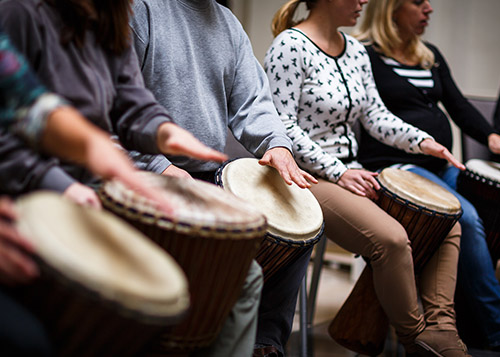Talk about it. Se habla español.

The Healing Power of Music: Connecting Sound, Emotion, and Wellbeing
By Em McElroy, Marriage and Family Therapist Trainee
Music has always been a constant in my life — a fellow companion during moments of anger, grief, heartache, joy, and everything in between. I’ve turned to music to make sense of feelings I couldn’t quite name and to find comfort when words felt too small.
Over time, I came to understand that music doesn’t just accompany our emotions. It helps us feel them more deeply, process and move through them, and sometimes transform them.
As a therapist, my lifelong connection to music naturally became part of how I understand the world, and how I strive to support others. The same qualities that make music so moving make it a powerful tool for healing: the rhythm, bass vibration, melodies, lyrics, and ability to bypass the analytical mind and tap into emotions.
The therapeutic benefits of music
Music has a profound effect on the brain and body. Research shows that it can lower stress hormones, reduce anxiety, and improve overall mood. But beyond science, many people intuitively feel music’s ability to shift emotional states. It can do everything from mobilizing us when we have low energy to soothing us when we’re overwhelmed.
Listening to or creating music engages the nervous system in a regulating way. The rhythm of a song can slow a racing heart, while melody and harmony can evoke feelings of safety and connection. For those who find it difficult to express emotions through words, music offers another language — one that speaks directly to the body and heart.
Shared musical experiences, whether listening together or creating sound as a group, can also build a sense of belonging and community. There’s something profoundly healing about feeling “in sync” with others.
How I use music therapy
In therapy, music can take many forms.
It might be as simple as bringing in and exploring a song that resonates with a client’s story, or using music to help regulate the nervous system. We might build personalized playlists to support emotional regulation or grounding between sessions, or listen to songs together in-session and discuss, if it feels right.
Sometimes, music can express what’s difficult to say aloud. You don’t need to be a musician for music to be therapeutic. You only need curiosity and willingness to listen, both inwardly and outwardly.
For many clients, these musical explorations can open access to deeper emotional layers, bringing forward memories, insights, and sensations that can be processed with direct support.
Looking ahead: Music therapy groups
In the near future, we’ll be offering expressive arts and music-focused therapy groups designed to bring people together in creative, mindful, and embodied ways. These groups will blend somatic awareness, mindfulness, and expressiveness. Our goal is to offer a safe space for connection, release, and play.
Some offerings in development include:
- Therapeutic Music Listening Circles, exploring emotion, connection, stories, and histories through music and sound.
- Vocal Expression, Mindful Movement, & Nervous System Regulation Workshops, reconnecting with the voice and body through music, as a grounding, liberating tool.
To learn more or to get started with music therapy for yourself, contact our team.

